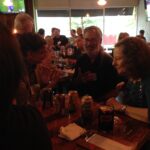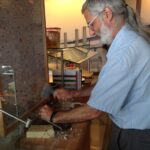 With the glow from the second Net Inclusion Summit in May starting to fade, last week we found ourselves on the road again, this time to the first national AFTRR meeting in Pittsburgh.
With the glow from the second Net Inclusion Summit in May starting to fade, last week we found ourselves on the road again, this time to the first national AFTRR meeting in Pittsburgh.
AFTRR, which stands for Alliance for Technology Refurbishing and Reuse, is an organization sponsored by Cristina Foundation to serve as a voice for nonprofit refurbishers. Google Pittsburgh hosted the 50-plus attendees in a one-day meeting giving members and affiliated organizations an opportunity to network and see presentations by the participants.
 Mobile Citizen sponsored a meet and greet on Sunday evening, providing a relaxed atmosphere for connecting with partners and meeting representatives of new organizations.
Mobile Citizen sponsored a meet and greet on Sunday evening, providing a relaxed atmosphere for connecting with partners and meeting representatives of new organizations.
At the meeting Tuesday, large sheets of paper were available where attendees were encouraged to write down issues they would like to discuss in small groups. During the first presentation session, Cristina staff organized the suggestions into 10 topic areas and the first break provided the opportunity to meet in self-selected groups under the topic headings. This was a great technique for encouraging focused conversation on a specific topic, though it would have been nice to  have more follow through on those discussions.
have more follow through on those discussions.
Google allowed us to eat in their company cafeteria for free, like their employees do. Amongst the many wonderful selections were huge chunks of white, milk and dark chocolate with a hammer and chisel.
The meeting presentation topics were:
- Revenue-producing strategies
- Advocacy issues
- Sourcing of equipment
- Managing software imaging
- The three legs of the digital inclusion stool
- E-waste management
It was a worthwhile meeting, with a number of valuable takeaways:
- AFTRR is a doing worthwhile work in connecting nonprofit refurbishers and I encourage you to consider joining if you refurbish computers.
- If you get the chance to eat in a Google cafeteria, grab it.
- Refurbishers come in all shapes and sizes and use different models. It’s worthwhile learning about other approaches.
- Providing some structure to networking topics greatly adds to the quality of the discussions.
- We learned of several (new to us) resources available for nonprofits and nonprofit refurbishers. Check out our updated page on Resources for non-profits.
- The advocacy work that has been promoted by Ifixit and others has a home in The Repair Association, at repair.org, which advocates for legislation and other solutions supporting the Right to Repair. Joining is free for non-profits.